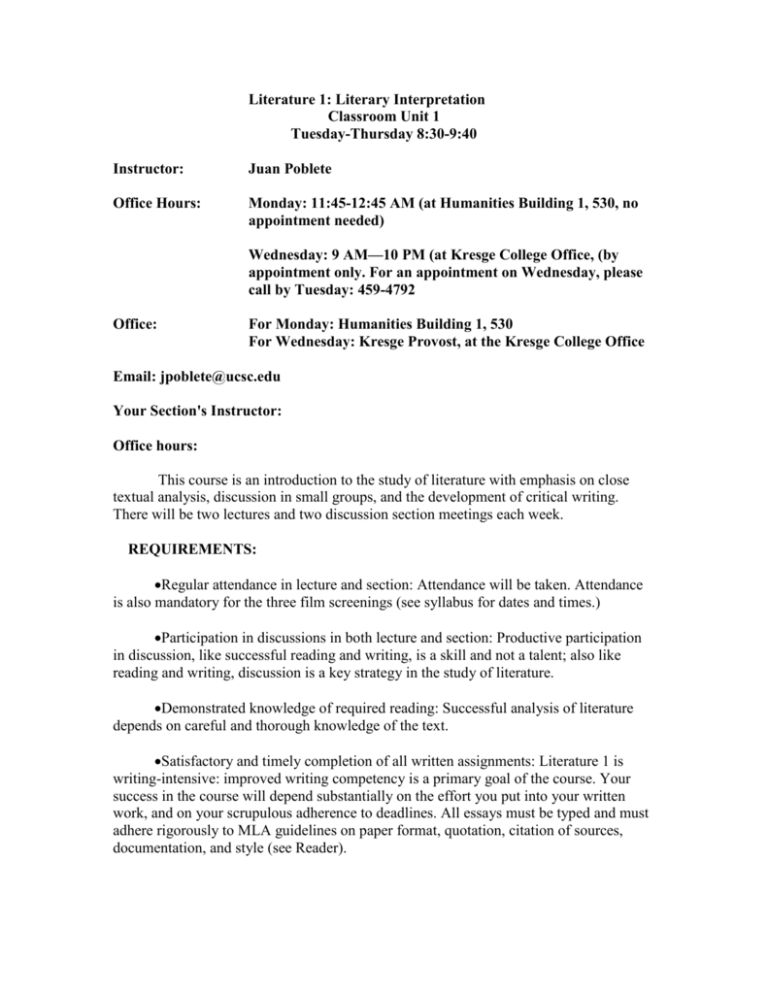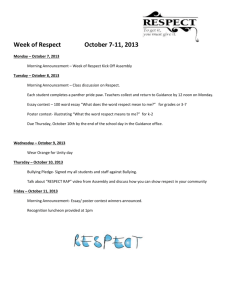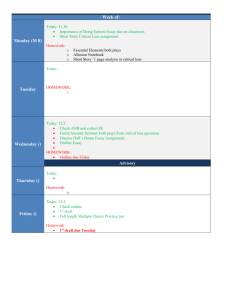Syllabus
advertisement

Literature 1: Literary Interpretation Classroom Unit 1 Tuesday-Thursday 8:30-9:40 Instructor: Juan Poblete Office Hours: Monday: 11:45-12:45 AM (at Humanities Building 1, 530, no appointment needed) Wednesday: 9 AM—10 PM (at Kresge College Office, (by appointment only. For an appointment on Wednesday, please call by Tuesday: 459-4792 Office: For Monday: Humanities Building 1, 530 For Wednesday: Kresge Provost, at the Kresge College Office Email: jpoblete@ucsc.edu Your Section's Instructor: Office hours: This course is an introduction to the study of literature with emphasis on close textual analysis, discussion in small groups, and the development of critical writing. There will be two lectures and two discussion section meetings each week. REQUIREMENTS: Regular attendance in lecture and section: Attendance will be taken. Attendance is also mandatory for the three film screenings (see syllabus for dates and times.) Participation in discussions in both lecture and section: Productive participation in discussion, like successful reading and writing, is a skill and not a talent; also like reading and writing, discussion is a key strategy in the study of literature. Demonstrated knowledge of required reading: Successful analysis of literature depends on careful and thorough knowledge of the text. Satisfactory and timely completion of all written assignments: Literature 1 is writing-intensive: improved writing competency is a primary goal of the course. Your success in the course will depend substantially on the effort you put into your written work, and on your scrupulous adherence to deadlines. All essays must be typed and must adhere rigorously to MLA guidelines on paper format, quotation, citation of sources, documentation, and style (see Reader). There will be five written assignments. Due dates are listed on the syllabus. 1. Two Close Reading Papers (3-5 pages) 15% each 2. Two Short Essays (4-6 pages) The second will be a substantial revision and expansion of the previous essay 15% each 3. Final essay (8-10 pages). 20% 4. Attendance to lecture and section 20% Many lectures will begin with a brief, informational quiz on the previous lecture or on the assigned readings for that day. We will screen three movies: Death and the Maiden, Kiss of the Spider Woman and Cat People. Dates are on the syllabus. Location to be announced. Attendance is mandatory for all three. REQUIRED TEXTS: (available at the Literary Guillotine, 204 Locust St. Downtown. Phone: 457-1195) 1. Puig Manuel. Kiss of the Spider Woman. New York: Vintage, 1991. 2. Rodriguez, Richard. Hunger of Memory. New York: Bantam Books, 1983. 3. Dorfman, Ariel. Death and the Maiden. New York: Penguin Books, 1991. 4. de Jesus, Carolina Maria. Child of the Dark. New York: A Mentor Book, 1963. 5. A required Reader is available at the Literary Guillotine. ACADEMIC INTEGRITY Obviously, cheating will not be tolerated in this class. Cheating in any part of the course may lead to failing the course and suspension or dismissal from the university. If in doubt, please consult me or your section instructor. You can also visit the UC Santa Cruz Academic Integrity web pages at http://www.ucsc.edu/academics/academic_integrity/undergraduate_students/resources.ht ml Please see also the last page of this syllabus for Examples of Violations of Academic Integrity. A final note about courtesy. This is a large lecture course. Please fill all front seats first, leaving the back of the room for latecomers. Please refrain from eating distracting food, talking to your neighbors, using a cellular phone, reading newspapers, or sleeping in class. If you must arrive late or leave early, unpack/pack your books outside, and make as little noise as possible. In short, please be considerate of others. SEPTEMBER Thursday 23 Introduction. Jonathan Culler, “What is Literature and Does it Matter? (an essay to be revisited throughout the class. We will come back to it in the last day of classes) Tuesday 28 The short story: E. Echeverría:"The Slaughter House," Inca Garcilaso de la Vega: "The Story of Pedro Serrano." Augusto Monterroso: "The Dinosaur", Cortázar on the short story, "Some aspects of the short story." Section: discussion on the uses and abuses of literature. What, what for, when, where do you read? Review basic concepts in Cortázar's essays. Thursday 30. Augusto Monterroso: "The eclipse." Cortázar on the short story, "On the Short Story and Its Environs," "Continuity of Parks." T. Wolff: "Bullet in the Brain" OCTOBER Tuesday 5. Cortázar: Cronopios and Famas, "Axolotl." "The Night Face Up". Section: workshop on "The Night Face Up." Thursday 7 NO LECTURE TODAY. BUT SECTIONS KEEP REGULAR SCHEDULE. Section: First close reading due (3-5 pages, on one of Cortázar's short stories). Poetry: Sor Juana Inés de la Cruz: p.148-174 and Response to Sor Filotea. Tuesday 12. The avant-garde literature. Vicente Huidobro: "Ars Poetica," "Canto III" and "Hours" Section: Between What I See and What I Say, Octavio Paz. Thursday 14. Neruda: Differing poetics. Selected Poems and Odes Tuesday 19. Drama: basic concepts. Antigone (in your reader) Section: Antigone Thursday 21. Drama: Death and the Maiden. Second close reading due (3-5 pages, on your favorite poem or lyrics from a song) Section: compare Antigone and Death and the Maiden Tuesday 26. Death and the Maiden Tuesday 26: 8:10 pm. Screening of Death and the Maiden. Thursday 28. Prose: the novel: Kiss of the Spider Woman Section: Compare play and film (Death and the Maiden) NOVEMBER Tuesday 2. Kiss of the Spider Woman. Section: On popular culture Thursday 4. Kiss of the Spider Woman. First essay due (4-6 pages on Kiss of the Spider Woman: Choose one of the movies that Molina retells and see how it relates to the novel as a whole. Thursday 4: 8:10 pm. Screening of Cat People Section: Choose one of the movies that Molina retells and see how it relates to the novel as a whole. Tuesday 9. Kiss of the Spider Woman. Selections from David Richter's Falling into Theory (Selections: Vendler, Graff, Rabinowitz) Thursday 11. No classes. Veterans Day. Monday 15: 8:10 pm. Screening of Kiss of the Spider Woman. Tuesday 16. Non fictional prose: Hunger of Memory Section: compare the movie (Kiss of the Spider Woman) with the novel Thursday 18. Non fictional prose: Hunger of Memory. Gusdorf: "Conditions and Limits of Autobiography" Second essay due: a rewrite (4-6 pages on Kiss of the Spider Woman (the novel): Choose one of the movies that Molina retells and see how it relates to the novel as a whole. Tuesday 23. Non fictional prose: Hunger of Memory. On Testimonio: Opening of I Rigoberta Menchú. Section: compare autobiography and testimonio Tuesday 30 Non fictional prose: Child of the Dark DECEMBER Thursday 2 Non fictional prose: Child of the Dark. Jonathan Culler, “What is Literature and Does it Matter? Final essay due on Monday, December 8th. (8-10 pages) Options for the final essay: A) compare autobiography and testimonio in relation to a particular aspect of two concrete texts. B) compare the movie (Kiss of the Spider Woman) with the novel in relation to popular culture. C) compare Antigone and Death and the Maiden in relation to one specific aspect. D) Death and the Maiden: compare play and film in relation to one specific aspect. E) Develop an essay on one or more of Julio Cortázar's short stories. F) Develop your own topic previously approved by your Instructor. Examples of Violations of Academic Integrity Cheating: Acting to gain unfair advantage over fellow students using such methods as copying another's work on a test or paper; plagiarism; using unauthorized materials in an exam; collaborating on work to be turned in for credit where such collaboration is disallowed by the instructor; altering graded coursework to increase a score or grade. Fabrication: In any academic exercise, submitting falsified data including bibliographic resources and experimental data, or altering graded coursework/exams and resubmitting to the instructor for a higher score. Facilitating Academic Dishonesty: Assisting another in violating the policy of Academic Integrity, such as taking an exam for another student or providing coursework for another student to turn in as his or her own effort Multiple Submission: Submitting the same work in multiple classes for credit Plagiarism: Submitting ideas or sentences as your own without proper citation or acknowledgement. Copyright Violation: Reproducing published (web-obtained or hand-copy) material without obtaining formal copyright release from owner. TABLE OF CONTENTS Jonathan Culler, “What is Literature and Does it Matter? (an essay to be revisited throughout the class. We will come back to it in the last day of classes) Garcilaso de la Vega, El Inca. "The Story of Pedro Serrano" 1-3 Esteban Echeverría: "The Slaughter House". 4-11 Julio Cortázar : "Some aspects of the short story " 12-19 "On the Short Story and Its Environs" 20-24 "Continuity of Parks". 25-26 T. Wolff: "Bullet in the Brain" 27-28 Augusto Monterroso: "The Dinosaur" and "The eclipse" 29-32 Julio Cortázar: Cronopios and Famas (selections) 33-62 "Axolotl." 47-49 "The Night face up". 50-56 "Poisons" 57-62 Sor Juana Inés de la Cruz.Selected Poems. - Response to Sor Filotea 63-116 79-116 Vicente Huidobro: "Ars Poetica", "Canto III" and "Hours" 117-125 Octavio Paz: "Between What I See and What I Say" 126-127 Pablo Neruda: Selected Poems and Odes. 128-146 Sophocles: Antigone 147-165 Helen Vendler: "What we have loved, others will love" 166-171 Gerald Graff: "Disliking Books at an Early Age" 172-175 Peter Rabinowitz: "Canons and Close Readings" 177-178 George Gusdorf: "Conditions and Limits of Autobiography" 180-190 Rigoberta Menchú: I Rigoberta Menchu (selections) 191-202 APPENDIX Erskine Peters: Fundamentals of Essay Writing: An Orientation Manual 203-211 John Peters: The Elements of Critical Reading 212-233 Donald Hall and Sven Birkerts: Writing Well 234-249 Bonnie Klomp Stevens and Larry L. Stewart: A Guide to Literary Criticism and Research 250-264 Susan Hubbuch: Writing Research Papers across the Curriculum 265-288 The MLA Style: from Hubbuch above. 289-299




